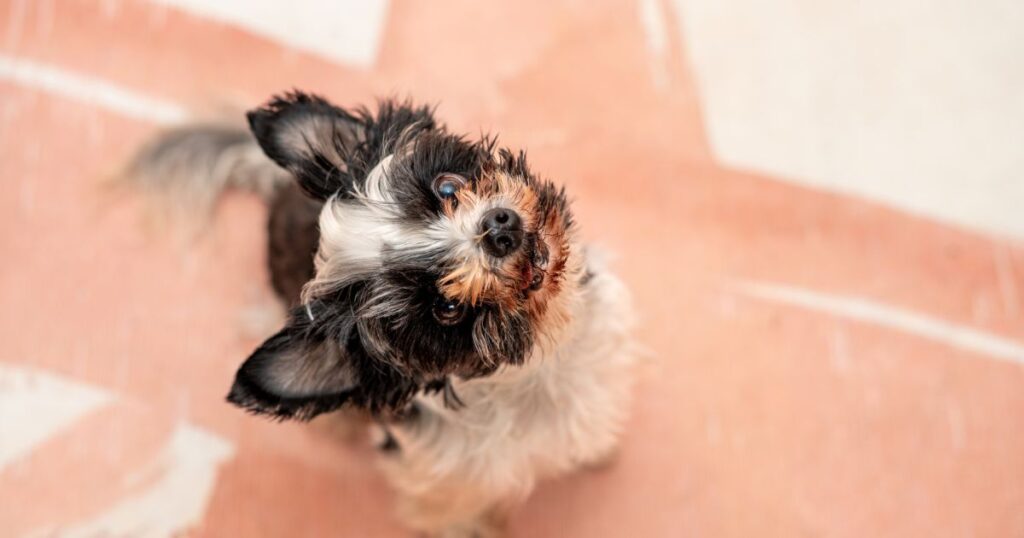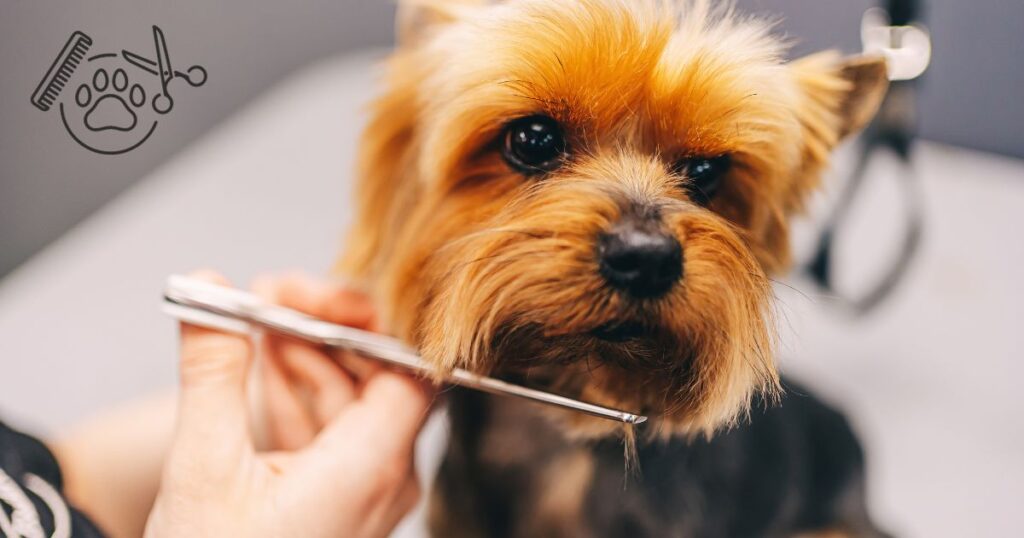How Old do Yorkies Have to be to Breed? [Both Male and Female]

As devoted pet parents, we understand the significance of responsible breeding practices. One of the fundamental questions that often arises is the ideal age at which Yorkies should begin their breeding journey. We’ll discover this mystery by shedding light on the recommended age for both female and male Yorkies to embark on their reproductive attempts.
The question, “How old do Yorkies have to be to breed?” is a vital question that showcases your dedication to responsible breeding. The answer, however, is not one-size-fits-all. Different factors come into play, including the individual health, maturity, and readiness of the Yorkie in breeding.
The appropriate age for Yorkies to start breeding varies between males and females. Female Yorkies should ideally be at least 2 years old before breeding, while male Yorkies can start breeding within the age range of 6 months to 2 years.
While it’s natural to feel excited about the arrival of Yorkie puppies, it’s crucial to prioritize the well-being of the dogs involved. Breeding too early can lead to potential health risks for both the mother and her offspring. Similarly, breeding too late might affect the overall health and life of the puppies.
When Can Female Yorkies Start Breeding?
Breeding female Yorkies is a sensitive process that requires careful consideration of their age and overall well-being. The recommended age for female Yorkies to start breeding is typically around 2 years. This age allows them to reach full physical and reproductive maturity, which is crucial for a successful and healthy breeding experience.
Waiting for Full Maturity
Waiting until female Yorkies are around 2 years old before breeding is essential for several reasons:
- Physical Development: Just like any other living being, female Yorkies go through various stages of physical development. Breeding them before they are fully matured can lead to complications during pregnancy and birth. Waiting until they are 2 years old ensures that their bodies are better developed to handle the demands of pregnancy.
- Reproductive Ability: Female Yorkies undergo a complex hormonal and reproductive cycle. Breeding them too early might disrupt this cycle and result in unsuccessful pregnancies or health issues for both the mother and the puppies. Allowing them to reach 2 years of age ensures that their reproductive systems are fully prepared for the breeding process.

Potential Risks of Breeding Too Early
Breeding female Yorkies before they are 2 years old can pose several risks:
- Health Complications: Early breeding can lead to health complications such as pregnancy-related stress, inadequate milk production, and increased risk of complications during delivery.
- Stunted Growth: Yorkies that are bred too early might not have fully developed bodies, leading to little growth and potential skeletal issues in both the mother and the puppies.
- Reduced Lifespan: Early breeding can potentially impact the overall lifespan of the female Yorkie, as it puts excessive stress on her body at a crucial developmental stage.
As responsible Yorkie owners, it’s our duty to prioritize the health and well-being of our beloved pets. Waiting until female Yorkies are around 2 years old before considering breeding ensures a higher likelihood of successful pregnancies, healthier puppies, and reduced risks for the mother.
At What Age Can Male Yorkies Start Breeding?
Just as with female Yorkies, the age at which male Yorkies can start breeding is a crucial consideration for responsible breeding practices. The optimal breeding age for male Yorkies falls within the range of 6 months to 2 years.
However, it’s important to note that age alone isn’t the only factor to consider when determining their readiness for breeding.
Importance of Sexual Maturity in Male Yorkies
Waiting until male Yorkies are at least 6 months old before considering breeding is essential because it allows them to reach a state of sexual maturity. Breeding them before they have fully developed sexually can lead to unsuccessful mating attempts and potential stress for both the male and the female Yorkie.
Male Yorkie’s Readiness for Breeding
Determining a male Yorkie’s readiness for breeding involves considering various factors:
- Physical Maturity: Beyond age, it’s important to ensure that the male Yorkie has reached his full physical development. This includes appropriate bone structure, muscle mass, and overall health.
- Sexual Behavior: Observing the male Yorkie’s behavior around females in heat can provide insight into his readiness for breeding. If he displays interest and appropriate mating behavior, it might be an indicator of his readiness.
- Sperm Fertility: Consulting a veterinarian for a semen analysis can help assess the quality of the male Yorkie’s sperm. Healthy sperm is essential for successful fertilization.
- Health Checks: Conducting thorough health checks, including genetic testing, ensures that the male Yorkie is free from hereditary health issues that could be passed on to the offspring.
Responsible Breeding Practices for Male Yorkies
Responsible breeding is not only about age but also about ensuring the overall well-being of the male Yorkie and the future litter. Breeding too early can lead to complications and health risks for both the male and the female, as well as the potential for unhealthy puppies.
By waiting until the male Yorkie has reached an appropriate age and has shown physical and behavioral readiness, we contribute to the betterment of the breed and the health of the Yorkie community as a whole.

Physical Traits for Breeding
Breeding Yorkshire Terriers is a responsibility that extends beyond age considerations. To ensure the health and well-being of both the parents and the puppies, it’s essential to evaluate and consider certain physical traits before proceeding with breeding.
Responsible breeding involves more than just matching two Yorkies—it involves careful planning and thorough assessments.
Necessary Health Checks and Genetic Testing
Before diving into the breeding journey, it’s crucial to prioritize the health of both the male and female Yorkies. This involves undergoing thorough health checks and genetic testing to identify any potential hereditary health issues that could be passed on to the offspring.
Health Checks: Consult with a veterinarian to conduct thorough health examinations, including checks of heart health, joint health, and overall physical well-being. Identifying and addressing any underlying health concerns will contribute to a successful and healthy breeding experience.
Genetic Testing: Genetic testing plays a crucial role in responsible breeding. It helps identify potential genetic mutations or conditions that may be present in the Yorkies’ lineage. By conducting genetic tests, breeders can make informed decisions to minimize the risk of passing on hereditary health issues.
Temperament and Behavioral Traits
Beyond physical traits, the temperament and behavior of the Yorkies are equally important considerations. Breeding should aim to produce puppies with desirable temperament traits that align with the breed standard. This involves evaluating aspects such as:
- Temperament: Ensuring that both the male and female Yorkies have a stable and friendly temperament that is characteristic of the breed. This contributes to well-adjusted and socially capable puppies.
- Behavior Traits: Considering behavior traits, such as trainability, adaptability, and sociability, can influence the overall nature of the puppies. Breeders aim to produce puppies that are easy to train and interact well with their human families.
Responsible Yorkie breeding is a commitment to excellence that requires meticulous attention to detail. By ensuring the right physical traits, conducting health checks and genetic testing, and considering temperament and behavior traits, breeders contribute to the betterment of the breed and the overall well-being of the Yorkie community.
Practical Tips for Successful Breeding
1. Ensure Pre-Breeding Health Examinations: Before breeding, it’s crucial to ensure that both the male and female Yorkies are in optimal health. Regular veterinary check-ups, genetic testing, and screenings for hereditary conditions can help identify and address potential issues.
2. Consider Nutritional Needs: Proper nutrition is essential for the health of the breeding pair and the developing puppies. Consult a veterinarian to create a balanced diet plan that supports the nutritional needs of the dogs throughout the breeding cycle.
3. Prepare for Whelping: Educate yourself about the whelping process and create a safe and comfortable environment for the pregnant female. Have essential supplies ready, such as a whelping box, clean towels, and a heating pad.
4. Care After Delivery: Caring for the mother and puppies after birth is a critical aspect of responsible breeding. Provide adequate nutrition, monitor the puppies’ growth, and seek veterinary assistance if any issues arise.
5. Follow Ethical Breeding Practices: Responsible breeding goes beyond physical considerations. It involves ethical considerations, including promoting the health and well-being of the breed, avoiding overbreeding, and prioritizing the long-term welfare of the dogs.

Reproductive Cycles of Female Yorkies
Female Yorkies, like all mammals, undergo a natural reproductive cycle that involves various stages. Understanding these stages is crucial for successful breeding and ensuring the health of both the mother and the puppies.
Proestrus: This is the initial stage of the reproductive cycle. Female Yorkies may exhibit slight changes in behavior and increased urination. During this time, they release pheromones that attract male dogs, although they are not yet ready for mating.
Estrus: Also known as the “heat” stage, estrus is the period during which female Yorkies are receptive to mating. This is when the most significant changes occur, both in behavior and physical appearance. It’s important to note that not all females will exhibit the same signs of estrus.
Diestrus: After estrus, if mating has not occurred, the female Yorkie enters diestrus. This phase involves a decrease in hormone levels and a return to the non-receptive state. If pregnancy occurs, diestrus continues as the body prepares for pregnancy and gestation.
Anestrus: This is the resting phase of the reproductive cycle, during which the female Yorkie’s body recovers and prepares for the next cycle. It is a non-receptive stage, and hormone levels are relatively stable.

Signs of Estrus in Female Yorkies
Recognizing the signs of estrus is essential to determine the ideal time for breeding. While the exact timing and duration of estrus can vary, common signs include:
- Swelling of the Vulva: The vulva becomes slightly swollen and may appear more noticeable than usual.
- Changes in Behavior: Female Yorkies may become more affectionate or seek attention from male dogs. They may also display restlessness or become more vocal.
- Bloody Discharge: A bloody discharge, ranging from light pink to a darker red, is often present during estrus.
- Licking and Cleaning: Female Yorkies may frequently lick their genital area to keep themselves clean.
Ideal Time for Breeding Female Yorkies During the Heat Cycle
Breeding during the heat cycle requires careful timing to maximize the chances of a successful pregnancy. The optimal time for breeding is usually during the latter part of the estrus phase when the female Yorkie is most receptive to the males.
Determining Ovulation: While the signs of estrus provide valuable hints, some breeders opt for additional methods to pinpoint ovulation. One such method that has gained popularity in the world of responsible Yorkie breeding is progesterone testing. This advanced diagnostic tool plays a crucial role in precisely identifying the exact timing of ovulation, allowing breeders to optimize the chances of successful breeding.

Progesterone is a hormone that plays a key role in regulating the reproductive cycle of female Yorkies. Progesterone levels rise gradually during the estrus phase and peak at the moment of ovulation. By measuring these progesterone levels through blood tests, breeders can accurately determine when the female Yorkie is at the peak of her fertility.
Progesterone testing provides breeders an opportunity for breeding with high accuracy. This information is valuable for coordinating the mating of the male and female Yorkies at the optimal moment, ensuring the best chances of successful fertilization.
Expert Tip: Seeking guidance from a veterinarian or experienced breeder can provide valuable insights into determining the best time for breeding based on the female Yorkie’s specific cycle.
Social Maturity and Breeding in Male Yorkies
Social maturity refers to the psychological and behavioral development of the dog, which plays a significant role in successful breeding and the overall well-being of both the male and the future litter. When considering breeding male Yorkies, it’s crucial to focus not only on their physical readiness but also on their social maturity.
Behavioral Traits: Social maturity is influenced by behavioral traits such as confidence, strength, and the ability to interact appropriately with other dogs and humans. Male Yorkies that display these traits are more likely to handle the breeding process and the responsibilities of fatherhood effectively.
Interactions with Other Dogs: Observe how the male Yorkie interacts with other dogs, especially females. A socially mature male will display respectful and controlled behavior, avoiding aggression or excessive dominance.
Response to Training: A socially mature male Yorkie is more receptive to training and can follow commands reliably. This trait is beneficial during breeding, as well as when caring for the pregnant female and the puppies.

The Importance of Social Maturity Before Breeding
Breeding a male Yorkie that lacks social maturity can lead to various challenges and potential issues:
- Behavioral Issues: Male Yorkies with a lack of social skills may struggle with anxiety, aggression, or other behavioral problems that can impact their ability to successfully mate and support the female during pregnancy.
- Stressful Breeding Experience: A socially immature male might find the breeding process overwhelming and stressful, leading to unsuccessful mating attempts and potential distress for both dogs.
- Parenting Skills: Socially mature males are more likely to be attentive and supportive fathers, actively participating in the care of the female during pregnancy and the puppies after birth.
How to Know if a Male Yorkie is Ready to Mate?
Assessing a male Yorkie’s readiness to mate involves a combination of behavioral observations and physical considerations:
- Age and Physical Development: Ensure that the male Yorkie has reached the recommended breeding age and has fully developed physically.
- Social Behavior: Observe how the male interacts with other dogs, particularly females. Look for signs of respectful and appropriate behavior.
- Interest and Engagement: A socially mature male Yorkie will display genuine interest in females and may start interactions during the heat cycle.
- Health and Well-Being: Conduct thorough health checks to ensure that the male is in optimal health and free from any underlying conditions that could affect breeding.

Expert breeders highlight that a socially mature male Yorkie contributes significantly to a successful breeding experience and the health of the future litter. Ensuring that the male is emotionally and behaviorally prepared for the responsibilities of breeding enhances the overall well-being of the dogs involved.
Frequently Asked Questions
How long is a Yorkie’s pregnancy duration?
A Yorkie’s pregnancy, also known as gestation, typically lasts for about 58 to 68 days, with the average falling around 63 days. However, it’s important to note that individual variations can occur. Monitoring the female’s behavior, and physical changes, and consulting a veterinarian are essential to precisely calculate the appropriate timing for whelping.
How many litters can a Yorkie have in a lifetime?
Yorkies can typically have around 3 to 4 litters in their lifetime, but it’s crucial to exercise caution and prioritize the well-being of the dogs. Breeding frequency, age, and overall health are significant factors that must be carefully considered.
Overbreeding is avoided through ethical breeding methods, which also protect the breed’s health and longevity for future generations.
What are some common breeding challenges with Yorkies?
One key challenge is ensuring successful mating and conception, where timing and compatibility are pivotal. Pregnancy-related issues, like labor difficulties or emergencies, may demand close monitoring and timely intervention. Newborn puppies require careful attention to ensure their survival, growth, and health.
Experienced breeders adopt a collaborative approach. Close cooperation with specialized veterinary professionals and seeking guidance from skilled breeders is valuable. The well-being of the breeding pair and their offspring is enhanced by shared knowledge, careful preparation, and constant observation when they go through the complexities of Yorkie breeding.
How Old do Yorkies Have to be to Breed – Summary
Breeding age plays a pivotal role in the health and genetics of Yorkshire Terriers (Yorkies), influencing the well-being of both the breeding pair and their future offspring. Responsible breeding practices are essential to diminish potential risks and ensure the long-term health of this beloved breed.
Breeding too early or late in a Yorkie’s life can have adverse effects on their health and the health of their puppies. Breeding a Yorkie too early, before they have reached their ideal breeding age, can lead to physical and reproductive immaturity, increasing the risk of complications during pregnancy and delivery.
On the other hand, breeding a Yorkie too late in life may also pose risks, as older dogs may have reduced fertility and an increased chance of pregnancy-related complications.
Genetic considerations are also important when determining the appropriate breeding age for Yorkies. Responsible breeders prioritize the health and longevity of the breed by conducting thorough health checks and genetic testing before proceeding with breeding. This helps identify and address potential hereditary health issues that could be passed on to the puppies.
By adhering to recommended breeding ages and focusing on optimal health and genetics, breeders can significantly contribute to the betterment of the Yorkie breed. Factors affecting Yorkie breeding age, such as the dog’s individual health, reproductive readiness, and overall well-being, must all be thoughtfully evaluated.
A balanced approach ensures that both the breeding pair and their future generations can flourish.
Understanding the impact of breeding age on Yorkie health and genetics highlights the necessity of responsible breeding practices. Breeding at the appropriate age, combined with comprehensive health assessments and genetic screenings, safeguards the well-being of these charming companions and strengthens the Yorkie breed for years to come.
Experts Insights
Lessons from knowledgeable Yorkie breeders and specialists can provide a Yorkie owner with a wealth of information and direction. Let’s explore the various aspects of responsible Yorkie breeding according to experts.
According to Experts, determining the optimal breeding age for Yorkies is a thorough process that requires a deep understanding of the breed’s physical and reproductive development. Experts emphasize the importance of waiting until both male and female Yorkies have reached their full maturity before attempting to breed. “Breeding at the right age ensures healthier litters and reduces the risk of complications,” Expert says.
Dr. Emily Johnson 1, a veterinarian specializing in small animal reproduction, emphasizes the importance of regular health assessments before breeding. “Conducting thorough health checks and genetic testing is crucial to identify potential health issues that could be passed on to the puppies,” she advises. “Breeding age and health go hand in hand.“
When discussing the social and reproductive maturity of male Yorkies, Michael Turner, an experienced breeder, highlights the necessity of observing behavioral cues 2. “A socially mature male exhibits confidence and displays appropriate mating behaviors,” Turner explains. He recommends introducing male Yorkies to different environments and dogs to promote their social development.
Successful breeding efforts greatly benefit from incorporating advice from experienced breeders and specialists as well as adhering to accepted Yorkie breeding rules. Their combined observations highlight the significance of careful planning, responsible practices, and continuous learning to maintain the well-being, longevity, and vitality of the cherished Yorkie breed.



